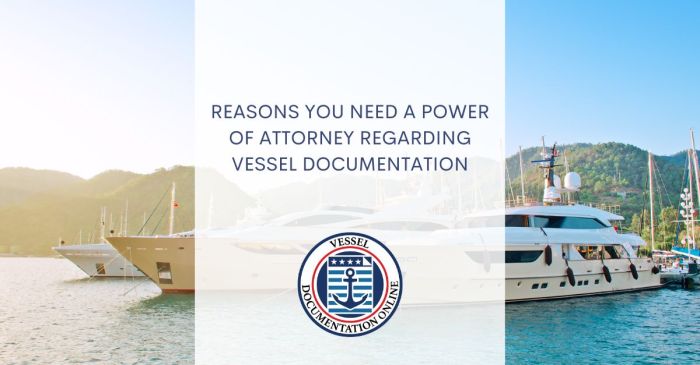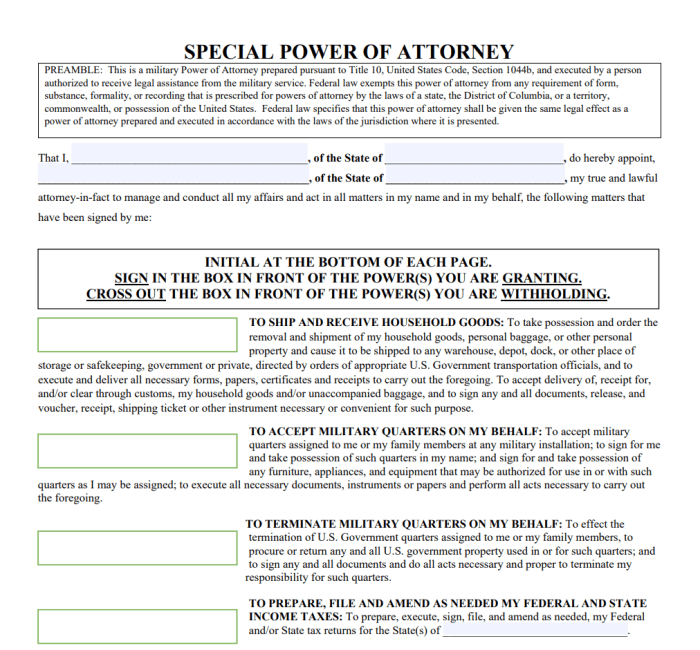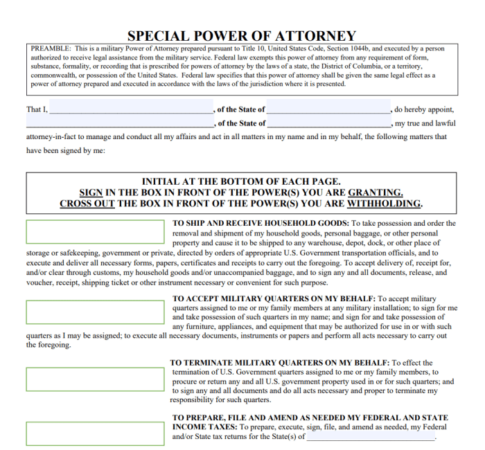
Navy Power of Attorney grants someone you trust the authority to handle your legal and financial affairs while you are away on active duty. This legal document empowers a designated agent to make decisions on your behalf, ensuring your affairs are managed effectively during your absence. The Navy Power of Attorney is a vital tool for service members, allowing them to maintain control over their personal and financial lives even while fulfilling their duties.
From managing your finances to making medical decisions, a Navy Power of Attorney offers peace of mind knowing your affairs are in capable hands. Understanding the different types, granting procedures, and potential limitations of a Navy Power of Attorney is crucial for every service member. This guide provides a comprehensive overview of this important legal tool, equipping you with the knowledge to make informed decisions about your personal affairs.
Understanding Navy Power of Attorney
A Navy power of attorney is a legal document that authorizes another person, known as an agent, to act on behalf of a service member. This document is crucial for service members who are unable to handle personal or financial matters due to their military duties. The power of attorney empowers the agent to make decisions and take actions on the service member’s behalf, ensuring their affairs are managed effectively in their absence.
Types of Navy Power of Attorney
A Navy power of attorney can be categorized into two main types: general and specific. These classifications determine the scope of authority granted to the agent.
- General Power of Attorney: This type grants broad authority to the agent to act on behalf of the service member in a wide range of matters, including financial transactions, legal proceedings, and property management. This type of power of attorney is typically used when a service member is deployed for an extended period or is facing a significant absence from their personal life.
- Specific Power of Attorney: This type grants limited authority to the agent, allowing them to handle specific tasks or situations. For instance, a specific power of attorney could authorize the agent to manage a service member’s bank account, pay bills, or handle real estate transactions. This type of power of attorney is commonly used when a service member needs assistance with a particular task but does not require the agent to have full control over their affairs.
Examples of Situations Requiring a Navy Power of Attorney
Several situations may necessitate the use of a Navy power of attorney. These scenarios highlight the importance of this document for service members and their families.
- Deployment: When a service member is deployed, they may be unable to manage their personal finances, handle legal matters, or make decisions about their property. A power of attorney can authorize an agent to handle these tasks on their behalf, ensuring their affairs are managed effectively while they are away.
- Medical Emergencies: If a service member is hospitalized or injured and unable to make medical decisions, a power of attorney can empower an agent to make medical decisions on their behalf. This is crucial for ensuring the service member receives the necessary medical care in their absence.
- Legal Proceedings: If a service member is involved in a legal matter, a power of attorney can authorize an agent to represent them in court. This is particularly important for service members who are deployed or stationed overseas and cannot attend court hearings in person.
- Real Estate Transactions: If a service member needs to purchase or sell property, a power of attorney can authorize an agent to handle the transaction on their behalf. This can be helpful for service members who are deployed or stationed in a different location and cannot personally manage the real estate process.
Granting Power of Attorney in the Navy
Granting power of attorney (POA) in the Navy is a formal process that allows a service member to designate someone else to act on their behalf in legal and financial matters. This can be especially important for sailors who are deployed or stationed overseas, as it ensures that their affairs are handled effectively in their absence.
Requirements for Granting Power of Attorney
A valid Navy power of attorney requires specific documents and procedures to be followed.
- Power of Attorney Form: The service member must use the official Navy power of attorney form, which can be obtained from the legal assistance office at their base or online.
- Identification: The service member must provide their full legal name, Social Security number, rank, and unit.
- Agent Information: The service member must provide the full legal name, address, and contact information of the person they are appointing as their agent.
- Scope of Authority: The service member must clearly define the specific powers they are granting to their agent. This could include the ability to manage finances, sign legal documents, or make medical decisions.
- Witnesses: The service member must have two witnesses present when signing the power of attorney form. These witnesses must be over the age of 18 and not the agent or the service member’s spouse.
- Notarization: The power of attorney form must be notarized by a notary public.
Eligibility for Serving as an Agent
Not everyone can serve as an agent under a Navy power of attorney. There are specific eligibility requirements that must be met:
- Age: The agent must be at least 18 years old.
- Mental Capacity: The agent must be mentally competent and able to understand the responsibilities of the role.
- Criminal Record: The agent cannot have a felony conviction or any other criminal history that could affect their ability to act on the service member’s behalf.
- Relationship to the Service Member: While the agent does not need to be related to the service member, they must have a trusted relationship with them.
Legal Implications of Granting Power of Attorney
Granting power of attorney is a significant legal action that carries certain risks and limitations:
- Liability: The agent is legally responsible for any actions they take on behalf of the service member. If they make a mistake or act negligently, the service member could be held liable.
- Abuse of Power: There is a risk that the agent could abuse their power and use it for their own benefit. This is why it is crucial to choose an agent who is trustworthy and has the service member’s best interests at heart.
- Limited Scope: The power of attorney only grants authority for the specific actions Artikeld in the document. The agent cannot exceed the scope of their authority without the service member’s explicit permission.
- Termination: The service member can revoke the power of attorney at any time by providing written notice to their agent.
Specific Powers Granted by a Navy Power of Attorney

A Navy Power of Attorney (POA) grants an individual, known as the agent, the authority to act on behalf of a service member, known as the principal, in various legal and financial matters. The specific powers granted by a POA are Artikeld in the document itself and can vary depending on the needs and preferences of the principal.
Financial Powers
Financial powers granted by a Navy POA allow the agent to manage the principal’s financial affairs. This can include accessing bank accounts, managing investments, paying bills, and making other financial decisions.
- Access to Bank Accounts: The agent can access and manage the principal’s bank accounts, including checking, savings, and money market accounts. They can deposit funds, withdraw money, transfer funds between accounts, and pay bills directly from the principal’s account.
- Investment Management: The agent can manage the principal’s investments, including stocks, bonds, mutual funds, and real estate. They can buy and sell investments, reinvest earnings, and make other investment decisions on behalf of the principal.
- Bill Payment: The agent can pay the principal’s bills, such as rent, utilities, credit card payments, and other recurring expenses. This can ensure that bills are paid on time and that the principal’s credit score is maintained.
Medical Powers
Medical powers granted by a Navy POA allow the agent to make medical decisions for the principal if they are unable to do so themselves. This can include authorizing medical treatment, accessing medical records, and making decisions about end-of-life care.
- Authorization of Medical Treatment: The agent can authorize medical treatment on behalf of the principal, including surgeries, medications, and other procedures. This can be essential if the principal is incapacitated or unable to make decisions for themselves.
- Access to Medical Records: The agent can access the principal’s medical records and share them with healthcare providers. This can be important for coordinating care and ensuring that the principal’s medical history is available to all involved parties.
- End-of-Life Care Decisions: The agent can make decisions about end-of-life care for the principal, including whether to provide life support, withhold or withdraw treatment, and make decisions about organ donation.
Legal Powers
Legal powers granted by a Navy POA allow the agent to act on behalf of the principal in legal matters. This can include signing legal documents, representing the principal in court, and making other legal decisions.
- Signing Legal Documents: The agent can sign legal documents on behalf of the principal, such as contracts, deeds, and wills. This can be necessary if the principal is unable to sign documents themselves.
- Legal Representation: The agent can represent the principal in court, including in cases involving personal injury, property disputes, and other legal matters. This can be important if the principal is unable to attend court proceedings or is not familiar with legal procedures.
- Other Legal Decisions: The agent can make other legal decisions on behalf of the principal, such as filing taxes, obtaining government benefits, and resolving legal disputes.
Revoking or Modifying a Navy Power of Attorney
A Navy Power of Attorney (POA) is a legal document that allows someone to act on your behalf in specific situations. However, you may need to revoke or modify this document for various reasons. This section explains the process of revoking or modifying a Navy POA, the circumstances that may prompt such actions, and the potential consequences of these changes.
Circumstances for Revoking or Modifying a Navy Power of Attorney
A Navy POA may be revoked or modified under several circumstances, including:
- Change in Circumstances: The individual granted POA may become incapacitated or unavailable. You may also decide to change your financial or legal arrangements, necessitating a revision of the POA.
- Loss of Trust: If you lose trust in the individual granted POA, or if their actions raise concerns, you may need to revoke the POA.
- Death of the Principal or Agent: The POA automatically terminates upon the death of either the principal (the person granting the POA) or the agent (the person granted the POA).
- Expiration of the POA: If the POA has a specific expiration date, it automatically terminates upon reaching that date.
- Change in Legal Status: A change in your legal status, such as marriage, divorce, or bankruptcy, may necessitate a revision of the POA.
Process for Revoking or Modifying a Navy Power of Attorney
Revoking or modifying a Navy POA generally involves the following steps:
- Prepare a Written Notice: Create a written notice stating your intention to revoke or modify the POA. This notice should be clear and concise, identifying the specific POA you are revoking or modifying and the effective date of the revocation or modification.
- Sign and Date the Notice: Sign and date the notice in front of a witness, preferably a notary public.
- Deliver the Notice: Deliver the notice to the individual granted the POA, either in person or by certified mail with return receipt requested.
- File the Notice: If required by the specific Navy regulations, file a copy of the notice with the appropriate Navy office or legal authority.
Consequences of Revoking or Modifying a Navy Power of Attorney
Revoking or modifying a Navy POA can have various consequences, including:
- Impact on Legal Transactions: The individual granted the POA may no longer be able to act on your behalf for any transactions initiated after the revocation or modification takes effect.
- Potential Legal Disputes: Revoking or modifying a POA may lead to legal disputes if the individual granted the POA disagrees with your decision or if they have already acted on your behalf based on the original POA.
- Need for New Authorization: If you need someone to act on your behalf after revoking or modifying a POA, you will need to grant them new authorization through a new POA or other legal document.
Resources and Additional Information

For those seeking additional information or guidance on Navy power of attorney, various resources are available. These resources can provide further insights into the process, specific requirements, and potential legal implications.
Official Navy Websites and Resources
The official Navy website is a valuable source for information about power of attorney. It offers detailed guidance on the process, forms, and procedures.
- United States Navy (USN) Official Website: The official USN website provides a wealth of information on various topics, including power of attorney. Search for “power of attorney” on the website to access relevant documents, FAQs, and contact information.
- Navy Legal Services Office (NLSO): The NLSO is the primary legal resource for Navy personnel. Contact the NLSO at your duty station or via the official website for legal advice and assistance related to power of attorney.
- Navy Family Law Center: The Navy Family Law Center offers information and resources specifically for Navy families, including guidance on power of attorney.
Legal Professionals Specializing in Navy Power of Attorney Matters
While the Navy provides resources, seeking legal advice from a qualified attorney specializing in Navy power of attorney matters can be highly beneficial.
- Navy Legal Assistance Attorneys: Navy Legal Assistance Attorneys are available at various Navy installations and can provide legal advice and assistance on power of attorney matters.
- Private Attorneys: Consider consulting a private attorney specializing in military law or estate planning. They can provide tailored advice and ensure your power of attorney document is compliant with both Navy regulations and state laws.
- Legal Aid Organizations: Some legal aid organizations provide assistance to low-income individuals, including those in the military. They may offer free or low-cost legal advice on power of attorney matters.
Comparison of General and Navy Power of Attorney
Understanding the key differences between a general power of attorney and a Navy power of attorney is crucial for making informed decisions.
| Feature | General Power of Attorney | Navy Power of Attorney |
|---|---|---|
| Scope | Broadly applicable to financial, legal, and personal matters | Limited to specific powers related to Navy affairs, such as accessing military records, receiving pay, and managing financial affairs while on active duty |
| Authority | Granting broad authority to the agent | Granting specific and limited authority to the agent |
| Formality | Typically requires notarization | Specific forms and procedures are prescribed by the Navy |
| Duration | Can be for a specific period or until revoked | Typically valid only while the service member is on active duty |
| Legal Requirements | Subject to state laws | Subject to Navy regulations and state laws |
End of Discussion

Navigating the complexities of a Navy Power of Attorney can be challenging, but understanding its purpose, processes, and limitations is essential for every service member. This guide has provided a foundation for understanding this important legal tool, enabling you to empower a trusted individual to manage your affairs while you focus on your service. Remember, seeking legal advice from a qualified professional specializing in Navy Power of Attorney matters is always recommended to ensure your specific needs are met.
FAQ Insights
Can I revoke a Navy Power of Attorney?
Yes, you can revoke a Navy Power of Attorney at any time. You must notify your agent in writing that you are revoking the power of attorney. It’s best to send the revocation notice by certified mail to ensure it’s received.
What if my agent is no longer able to serve?
If your agent is unable to serve, you can appoint a new agent by creating a new Navy Power of Attorney. It’s important to update your power of attorney regularly to ensure it reflects your current wishes.
Is there a specific form for a Navy Power of Attorney?
Yes, there is a standard Navy Power of Attorney form. It’s available on the Navy’s official website and can be accessed through the legal assistance office at your nearest base.
What are the consequences of not having a Navy Power of Attorney?
Without a Navy Power of Attorney, your legal and financial affairs might be difficult to manage while you’re away on active duty. You may face delays or complications in accessing your assets or making critical decisions.





